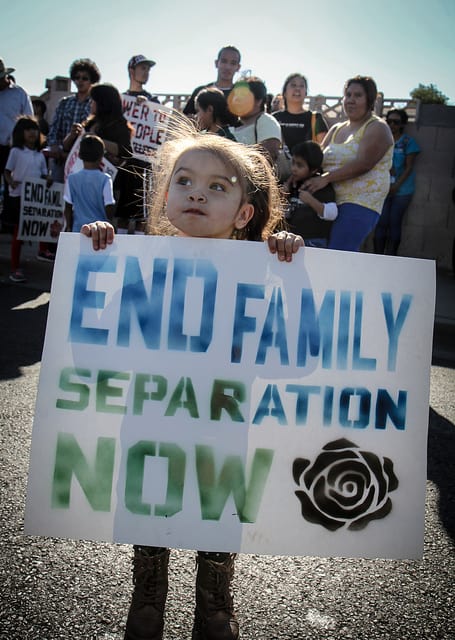 “If you hold back from rescuing those taken away to death, those who go staggering to the slaughter; if you say, ‘Look, we did not know this’—does not he who weighs the heart perceive it? Does not he who keeps watch over your soul know it? And will he not repay all according to their deeds?” (Proverbs 24:11-12)
“If you hold back from rescuing those taken away to death, those who go staggering to the slaughter; if you say, ‘Look, we did not know this’—does not he who weighs the heart perceive it? Does not he who keeps watch over your soul know it? And will he not repay all according to their deeds?” (Proverbs 24:11-12)
Save us now from satisfaction when we privately are free, yet are undisturbed in spirit by our neighbor’s misery. (Elton Trueblood, in the hymn, “Christ Whose Purpose Is to Kindle,” 1966)
The political theater around the topic of immigration can best be described as painfully comic, especially in election seasons, as each candidate frets and spins in a clumsy attempt to communicate a coherent position. It reminds me of that scene in the comedy Meet the Parents where a panic-stricken young man feigns love of cats in order to score points with his future father-in-law. Beads of sweat appear on the candidates’ brows as the questions fly through their minds: How can I prove tougher than my opponent on illegal immigration? How do I do that without sounding like a racist? What if they ask me about those sanctuary ordinances? The driver’s license proposal? My gardener? Will a compassionate stance make me look soft on crime and terrorism? How about the Latino vote? How do I explain my “yes” vote on the 700-mile fence? Should I divert attention to tough employer sanctions? Those law-breaking meat-packing plants? What if that alienates my business constituency? Is it more politically expedient, at the given moment, to emphasize affection for cats or disdain for dogs?
While some might derive cynical pleasure from watching would-be leaders dance and stammer, the morally spineless nature of such issue-skirting is no laughing matter. A political “third rail” (i.e. touch it and die) issue like immigration is particularly subject to duplicitous sound-bite posturing that, more often than not, hides ugly realities few dare to address. At best, experienced politicians keep the conversation safe, striking an ideological balance between imperatives of “enforcement” and “earned citizenship” or waxing eloquent about the rule of law or the historic role of immigration. Such rhetorical surface banter, I would argue, is buffering our collective conscience from the inhumane treatment we as a nation are currently inflicting upon “the strangers in our midst.”
While left and right engage in fruitless dialogue about “comprehensive immigration reform,” real people are suffering under the increasingly heavy hand of our own government. We have all heard about the ICE (Immigration and Customs Enforcement) raids ordered by the Department of former Secretary of Homeland Security Michael Chertoff (“Operation Return to Sender”). Few are aware of the more recent push to implement “no-match” (of Social Security IDs) letters to force employers to fire their undocumented workers.
Fewer still know that hundreds of millions in tax dollars are being spent on private contractors to erect mass detainment facilities throughout the country. And almost absent in the media are human faces to the state-sanctioned cruelty being committed within our own borders. The following snapshots, paraphrased from the report Over-Raided, Under Siege, are just three of thousands of documented accounts:
“ICE agents stormed the home of Nelly Amaya, entered her bedroom, and conducted a search without identifying themselves. ICE roughed her up as they frisked and arrested her, twisted her arm, aggravating an existing injury. Her arm was swollen and bruised after the handcuffs were put on. On the way to the station, she suffered an asthma attack, which went untreated.”
“After the trauma of the ICE raid at the plant, electronic monitoring shackles were placed on the ankles of 33 women who were released but kept under house arrest. Almost all being mothers, and the sole providers for their family, they faced insurmountable barriers to provide for their families because they were not allowed to work.”
“ICE forcibly separated an 8-year-old girl from her pregnant mother and left her alone for four days at a residential facility. The mother and child cried inconsolably after they were awakened as the mother was taken away. Having fled Honduras earlier to escape an abusive relationship and gang violence, they were denied asylum. The mother and child were only reunited after being deported back to Honduras.”
Over 34,000 immigrants in detention facilities (these numbers are actually mandated, to fill a quota); thousands of workplace arrests, border deaths, and deportations. Social vilification. Separation of families. Withholding of health services. Physical abuse.
We are being told to accept, essentially, that this is just what happens to those who “don’t play by the rules.” God’s people, however, are called to live by a different set of rules. The current immigration crisis, therefore, represents a moral “third rail” for the American church. How we engage it can be the difference between life and death.
Craig Wong is a “minister at-large” for Grace Fellowship Community Church in San Francisco.


